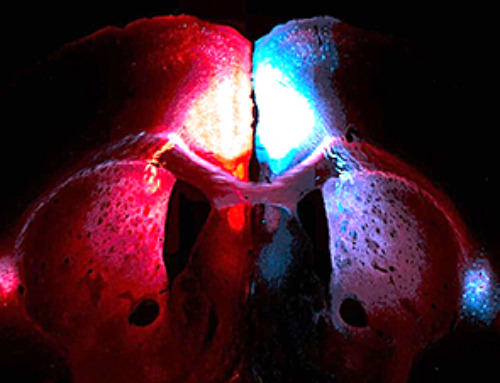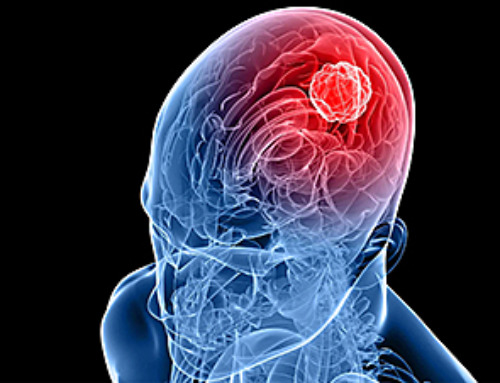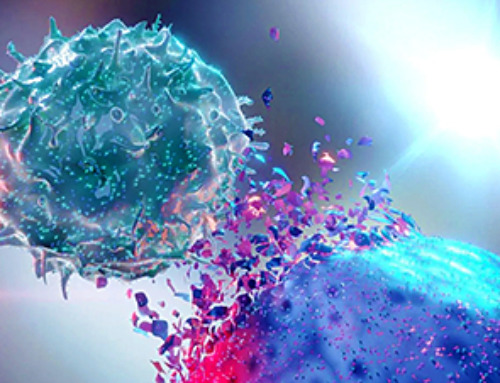A team of scientists from Thailand has developed a curcumin-containing oro-nasal film spray, which shows potential antiviral activity and mucosal immunity-boosting activity against severe acute respiratory syndrome coronavirus 2 (SARS-CoV-2) and influenza viruses.
The study is published in the Virology Journal.
Background
SARS-CoV-2, the causative pathogen of coronavirus disease 2019 (COVID-19) pandemic, is an enveloped RNA virus that primarily causes mild to severe respiratory infections. Influenza virus types A, B, and C are also RNA viruses that cause seasonal respiratory infections commonly known as flu.
Infections caused by SARS-CoV-2 and influenza viruses are associated with high mortality rates. Although both viruses can affect people from all age groups, more deadly infections occur in older people and immunocompromised patients.
Bioactive compounds derived from plants have gained immense attention in the medical community because of their potent antioxidant, anti-inflammatory, anticancer, and antimicrobial activities. Curcumin is a promising plant-derived compound that shows potential antiviral and immunomodulatory activities against SARS-CoV-2 and influenza A virus.
In this study, scientists have developed an oro-nasal film spray containing curcumin and tested its antiviral and mucosal innate immunity-boosting activities against SARS-CoV-2 and influenza viruses.
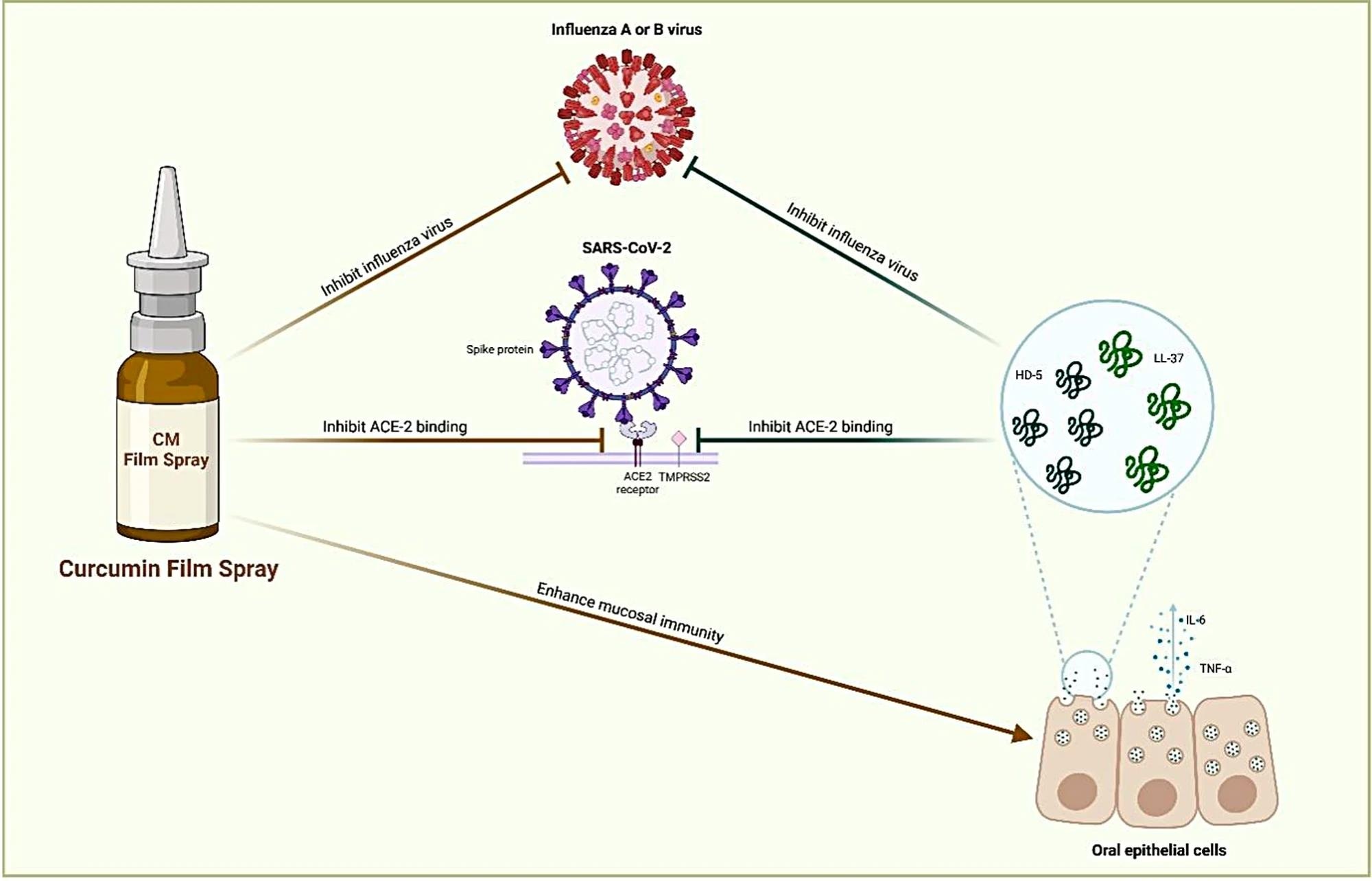 Various actions of the curcumin film spray. Formulation of curcumin film spray shows various actions on prevention of COVID-19; First, it can inhibit SARS-CoV-2 infection by inhibiting ACE-2 binding. Second, the film spray upregulates the production of antimicrobial peptides LL-37 and HD-5 produced by oral epithelial cells, which have been previously reported to inhibit SARS-CoV-2 infection in silico. Third, the film spray induced the production of antiinflammatory cytokines IL-6 and TNF-α produced by oral epithelial cells. In addition, the film spray inhibits influenza virus infection.The infographic was designed by BioRender.com (https://app.biorender.com)
Various actions of the curcumin film spray. Formulation of curcumin film spray shows various actions on prevention of COVID-19; First, it can inhibit SARS-CoV-2 infection by inhibiting ACE-2 binding. Second, the film spray upregulates the production of antimicrobial peptides LL-37 and HD-5 produced by oral epithelial cells, which have been previously reported to inhibit SARS-CoV-2 infection in silico. Third, the film spray induced the production of antiinflammatory cytokines IL-6 and TNF-α produced by oral epithelial cells. In addition, the film spray inhibits influenza virus infection.The infographic was designed by BioRender.com (https://app.biorender.com)
Study design
The antiviral activity of oro-nasal film spray containing 10 µg/ml of curcumin was tested against SARS-CoV-2, influenza A/H1N1, influenza A/H3N2, and influenza B by plaque reduction assay. Different cytotoxicity assays were conducted to determine the viability of oral keratinocytes, nasal epithelial cells, and other tested cell lines in response to the film spray.
Enzyme-linked Immunosorbent assay (ELISA) was conducted to determine the levels of oral and nasal innate immune markers (LL-37, HD-5, and human β defensin 2) in response to the film spray. Moreover, the levels of pro-inflammatory markers (interleukins, tumor necrosis factor, and interferon) were also determined.
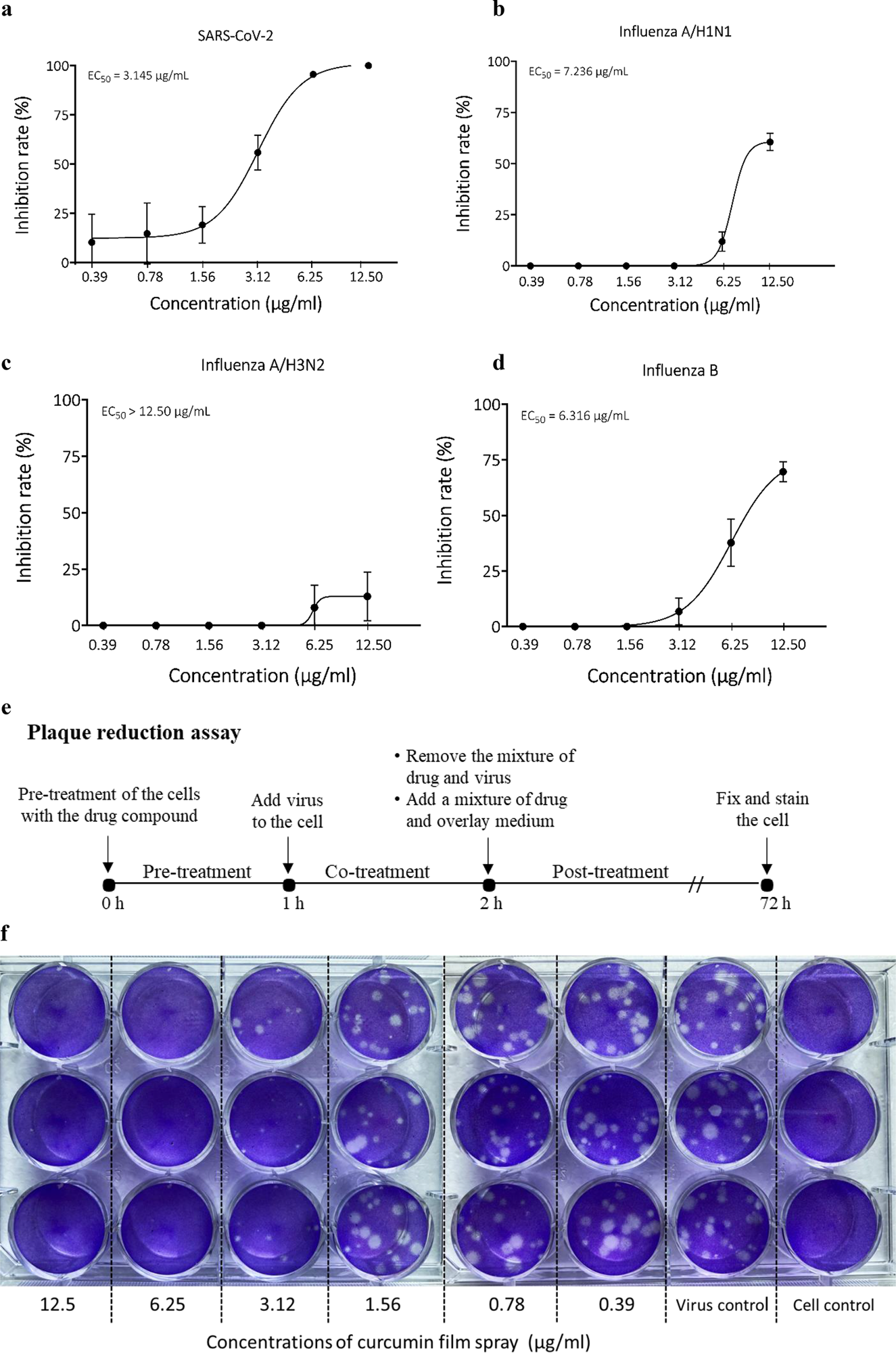
Important observations
The fundamental physical properties of the curcumin formulation, including color, pH, droplet size, osmolarity, and viscosity, were tested in the study. The findings showed no alteration in properties after freeze-thawing, indicating the stability of the formulation.
Regarding the cytotoxicity and antiviral activity of curcumin, the study found that the compound is capable of inhibiting viral infection at 6.25 µg/ml concentration by blocking the interaction between SARS-CoV-2 spike protein and human cell membrane receptor angiotensin-converting enzyme 2 (ACE2). At the tested concentration, no cytotoxic effect of curcumin compound was observed.
Similar to the curcumin compound, curcumin-containing film spray showed significant efficacy in inhibiting viral infection at 10 µg/ml concentration without affecting cell viability. The selectivity index of curcumin compound and curcumin-containing film spray was estimated to be 1.23 and 1.68, respectively. The selectivity index defines the window between cytotoxicity and antiviral activity. The higher the index value, the more effective and safer a drug would be during an in vivo treatment for a given viral infection.
Regarding antiviral activities against all tested viruses, the study found that curcumin film spray has the highest inhibitory activity against SARS-CoV-2, followed by influenza B virus and influenza A/H1N1 virus. However, the spray showed only a slight inhibitory activity against influenza A/H3N2 virus.
Effect of curcumin film spray on mucosal innate immunity
The estimation of oral and nasal innate immunity markers revealed that curcumin film spray could significantly induce the secretion of antimicrobial peptides LL-37 and HD-5 and reduce the secretion of hBD-2 protein by oral keratinocytes. However, no upregulated secretion of antimicrobial peptides from nasal epithelial cells was detected in response to the curcumin spray.
Regarding inflammatory cytokines, oral keratinocytes produced an upregulated amount of interleukin 6 and tumor necrosis factor-alpha in response to curcumin film spray. However, nasal epithelial cells did not experience such an effect.
Study significance
The study describes the antiviral and immunomodulatory activities of a novel curcumin-containing oro-nasal film spray. The spray exhibits significant inhibitory activity against SARS-CoV-2 and influenza viruses without inducing cytotoxicity at therapeutic doses. The spray is also capable of inducing the secretion of antimicrobial peptides and anti-inflammatory mediators by oral keratinocytes.
Overall, the study indicates that this curcumin film spray may be effectively used to block viral entry into host cells, prevent lung injury, and reduce disease severity.
- Nittayananta W. 2024. A novel film spray containing curcumin inhibits SARS-CoV-2 and influenza virus infection and enhances mucosal immunity. Virology Journal. https://virologyj.biomedcentral.com/articles/10.1186/s12985-023-02282-x
News
Rejuvenating neurons restores learning and memory in mice
EPFL scientists report that briefly switching on three “reprogramming” genes in a small set of memory-trace neurons restored memory in aged mice and in mouse models of Alzheimer’s disease to level of healthy young [...]
New book from Nanoappsmedical Inc. – Global Health Care Equivalency
A new book by Frank Boehm, NanoappsMedical Inc. Founder. This groundbreaking volume explores the vision of a Global Health Care Equivalency (GHCE) system powered by artificial intelligence and quantum computing technologies, operating on secure [...]
New Molecule Blocks Deadliest Brain Cancer at Its Genetic Root
Researchers have identified a molecule that disrupts a critical gene in glioblastoma. Scientists at the UVA Comprehensive Cancer Center say they have found a small molecule that can shut down a gene tied to glioblastoma, a [...]
Scientists Finally Solve a 30-Year-Old Cancer Mystery Hidden in Rye Pollen
Nearly 30 years after rye pollen molecules were shown to slow tumor growth in animals, scientists have finally determined their exact three-dimensional structures. Nearly 30 years ago, researchers noticed something surprising in rye pollen: [...]
NanoMedical Brain/Cloud Interface – Explorations and Implications. A new book from Frank Boehm
New book from Frank Boehm, NanoappsMedical Inc Founder: This book explores the future hypothetical possibility that the cerebral cortex of the human brain might be seamlessly, safely, and securely connected with the Cloud via [...]
How lipid nanoparticles carrying vaccines release their cargo
A study from FAU has shown that lipid nanoparticles restructure their membrane significantly after being absorbed into a cell and ending up in an acidic environment. Vaccines and other medicines are often packed in [...]
New book from NanoappsMedical Inc – Molecular Manufacturing: The Future of Nanomedicine
This book explores the revolutionary potential of atomically precise manufacturing technologies to transform global healthcare, as well as practically every other sector across society. This forward-thinking volume examines how envisaged Factory@Home systems might enable the cost-effective [...]
A Virus Designed in the Lab Could Help Defeat Antibiotic Resistance
Scientists can now design bacteria-killing viruses from DNA, opening a faster path to fighting superbugs. Bacteriophages have been used as treatments for bacterial infections for more than a century. Interest in these viruses is rising [...]
Sleep Deprivation Triggers a Strange Brain Cleanup
When you don’t sleep enough, your brain may clean itself at the exact moment you need it to think. Most people recognize the sensation. After a night of inadequate sleep, staying focused becomes harder [...]
Lab-grown corticospinal neurons offer new models for ALS and spinal injuries
Researchers have developed a way to grow a highly specialized subset of brain nerve cells that are involved in motor neuron disease and damaged in spinal injuries. Their study, published today in eLife as the final [...]
Urgent warning over deadly ‘brain swelling’ virus amid fears it could spread globally
Airports across Asia have been put on high alert after India confirmed two cases of the deadly Nipah virus in the state of West Bengal over the past month. Thailand, Nepal and Vietnam are among the [...]
This Vaccine Stops Bird Flu Before It Reaches the Lungs
A new nasal spray vaccine could stop bird flu at the door — blocking infection, reducing spread, and helping head off the next pandemic. Since first appearing in the United States in 2014, H5N1 [...]
These two viruses may become the next public health threats, scientists say
Two emerging pathogens with animal origins—influenza D virus and canine coronavirus—have so far been quietly flying under the radar, but researchers warn conditions are ripe for the viruses to spread more widely among humans. [...]
COVID-19 viral fragments shown to target and kill specific immune cells
COVID-19 viral fragments shown to target and kill specific immune cells in UCLA-led study Clues about extreme cases and omicron’s effects come from a cross-disciplinary international research team New research shows that after the [...]
Smaller Than a Grain of Salt: Engineers Create the World’s Tiniest Wireless Brain Implant
A salt-grain-sized neural implant can record and transmit brain activity wirelessly for extended periods. Researchers at Cornell University, working with collaborators, have created an extremely small neural implant that can sit on a grain of [...]
Scientists Develop a New Way To See Inside the Human Body Using 3D Color Imaging
A newly developed imaging method blends ultrasound and photoacoustics to capture both tissue structure and blood-vessel function in 3D. By blending two powerful imaging methods, researchers from Caltech and USC have developed a new way to [...]

















